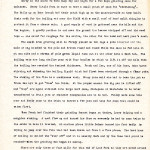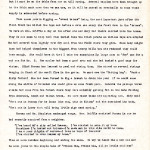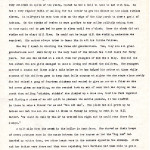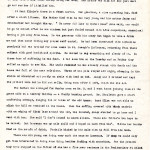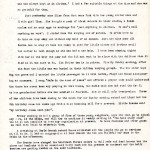Pine Mountain Settlement School
Dr. Ida Stapleton and Rev. Robert Stapleton
Line Fork 1927 – 1947
STAPLETON REPORT – October 1931
“Early in the month we were busy day and night for a few days grinding cane for molasses…”
GALLERY
TRANSCRIPTION
Line Fork Settlement Gilley P O Kentucky
October Leaves 1931
Early in the month we were busy day and night for a few days grinding cane for molasses. Every little farm is sure to have a small patch of cane for “sweetening”. The Halls up on Bear Branch had their patch high up on the mountain-side so they built their arch for the boiling vat near the field with a small roof of hand split shingles to protect it from a chance rain. A good supply of wood is gathered near the kiln and the fun begins. A goodly portion is cut near the ground the leaves stripped off and the seed tops – one saved for roughage for the cattle, the other for the hens and next year’s seed.
The small iron grinding mill is firmly placed on two logs a pole inserted and the mule or nag hitched to the pole and driven round and round while the cane is fed into it at one side and a stream of pale green liquid runs out at the other into a wash tub. The boiling vats are long shallow pans with four handles by which to lift it off the kiln when the boiling has reached the desired thickness. Frank and Ira, one of his boys, take turns stirring and skimming the boiling liquid which had first been strained through a flour poke. The stoking of the fire is a continuous work. Nancy Jane said she had to boss the job as Frank was apt to get “them” too thick. At the proper moment the big pan is lifted off and “they” are again strained into large lard cans, dish-pans or wash-tubs to be later transferred to fruit jars or whatever receptacles are to be had. Finley made some this year and Neely came to the Cabin to borrow a few jars and tins for some that could be eaten first.
When Frank had finished their grinding Bennet began on theirs, Lorry helping and a neighbor stoking. A coal flew up and burned his face so severely he had to come twice to the Cabin to have it treated. At another place little Delmar burned his foot badly by trying to jump over the fire that had been drawn out from the fire place. The last hour of boiling is called the “stir off” and it is usually dark and by the time that point is reached – when the grinding was begun at sun-up.
There are only three or four mills for this end of Line Fork so they are moved around from hill farm to another on wooden sleds. As the various stir-offs come on the young people visit around to have some fun at the mill. Joints of cane are held in the fire, and they explode with a sharp report. Short lengths of cane are prepared as tasting spoons and dipped into the finished molasses. Some say they like it only at that time, but it must be on the table from now on till spring. Several samples have been brought up to the Cabin much more than we can use, so it will be passed on eventually to some whose supply is exhausted before spring.
Then comes potato digging – “sweet taters” being the most important just after the first frost has killed the tops and before a rain can carry the frost down to the “taters”. We were at Mrs Griffis a day or two after she and Mary had theirs carried into the house. They do not seem to keep well when buried like the Irish potato so various ways are adopted. She had covered them lightly with dry soil from the field where they grew. Some lazy neighbors had helped themselves to the biggest from twenty hills but she reckoned they would have enough. She would have it that I take two large ones to “fry” one for me and one for Mr S. Her apples had been a good crop and she had buried a good many for winter. Blind Norman has learned to peel and string them. She showed me several strings hanging in front of the small fire in the grate. We must see the “fatting hog”. “Such a dirty fellow!” She had been forced to dig a trench to drain his pen. If we could come along the middle of November she would give us some fresh pork. Outside the palings three shoats had come from the forest where they were actually getting fat on the nuts falling from chestnut, beech and walnut trees. No more razor backs are appearing now. Mary said “That one is Possum for he looks like one, this is Kitten” and she scratched its back. “That one is Lorry that will bring little pigs next spring.”
Norman and Mr Stapleton exchanged songs. Mrs Griffis assisted Norman in one he had recently acquired from a neighbor.
“I’ve heard of a city called Heaven. I’ve started to make it my home
Sometimes I’m tosted and driven – I’m cast out in this wide world to roam.
I am a poor pilgrim of sorrow – I have no hope of tomorrow
I’ve started to make Heaven my home”
Five or more verse beginning and ending the same. We try to teach him a new one and he soon joins in the simple tune of “Praise him, Praise him, all ye little children”. Each verse is the same except for the first word which runs the changes with Thank, Love, Serve Him.
Mary was vastly amused by a little new toy we had given her – a bouncing ball attached to a flat bat. Noticing her doll in its little bed Mrs Griffis said that Norman who is very childish in spite of his years, wished he had a doll to take to bed with him. He has a very regular habit of calling for his mother to get his dinner as the clock strikes eleven. At half-past he eats then sits on the edge of the tiny porch to chew a grain of tobacco. On the stroke of twelve he says goodbye to any caller politely asking them to come again and to bed he goes to sleep until two o’clock. Once the clock did not strike and he slept till five. He could not be happy till the striking mechanism was repaired. His mother always tries to humor him in all his little foibles.
One day I spent in visiting the three old grandmothers. Yes, they are all great grandmothers now! Aunt Sally at the very head of the branch has lived there for forty years. Her man was killed at a still when her youngest of six was a baby. She and the two oldest who are girls managed to make a living and raised the children. The youngest married a cousin and lives only a mile below so he has helped his mother at times while someone of his children goes to keep Aunt Sally at nights tho she stays alone mostly. She had raised a gang of fourteen chickens and wanted to give me one as a frier as she had never given me anything, so she reached down an ear of corn that was drying on the porch then calling “chickie, chickie” she picked up a nice one, tied its feet together and finding a piece of an old quilt to protect the saddle pockets, it was stuffed in there to make a dinner for me and “the old man”. The place has all grown up to briars now but the son who owns it lives in Putney is trying to rent it to Will Ratliff. “He would do well by him if he treated him right and he could stay there for always.”
A half mile down the creek in the hollow is Aunt Jane. She showed me their heaps of sweet potatoes some in the space between the two houses called the “dog run” but boarded up with a door, two other heaps were in the corners opposite the chimney. Altha and her babies were there and they were rejoicing that Harrison had been able to get a cow by clearing three acres of briers for cousin Polly Davidson. She was giving a little milk but would “find her calf” in January. Altha just came in to get a little “treatment” for the least one. She was on her way to visit her own mother down Greasy – fifteen miles away, which she was walking while carrying her baby. She hoped they would meet her but if they didn’t they would surely bring her back. Her mother was sick and she just must go and see her if it killed her.
At Aunt Elizie’s there is fresh sorrow. Her grandson, a nice appearing boy, died after a short illness. His father died when he was very young and his mother Janey and Grandmother had brought him up. “He never did like to work at home” Jane said, nor would he go to school after he was sixteen but just fooled around with his idle companions, occasionally having a job away from home. He was generous with his money but began to take a drink now and then never having any proper self control. He had been threatened with infantile paralysis and was treated for some weeks in St Joseph’s Infirmary, returning from there radiant with good health and spirits. He wanted to eat everything and plenty of it. In three days of suffering he was dead. I had seen him on the Tuesday and on Friday they called me again to see him. His uncle reckoned he was already struck with death and the house was full of the near relations. Three of his pals stayed all night, sleeping in the chairs or stretched out partly on chair with head on bed. Janey and I watched and kept the patient warm but he did not rally, dying soon after I left, which was six AM.
The burial was arranged for Sunday noon so Mr S and I went down joining them at the grave side on a near-by hilltop – a family burying ground. Mr Stapleton gave a short comforting message, singing two or three of the old hymns. Aunt Eliza was not able to climb the hill so remained at the house. When the coffin, covered with black cambric with an edging of black lace around the lid, was lowered, Janey started to go home and I went with her. She said, “I don’t intend to mourn allers. There are Will’s two boys to be raised. But Lawrence was my only child and I hoped so much from him”. Willie her brother died as the result of drink. Probably kicked by his mule when he fell from its back.
There are six young men doing very much the same as Lawrence. If we could only get them interested in doing something besides fooling with moonshine. For the present theyhave stopped as the father of one has a five year sentence in the Penitentiary at Atlanta.
Young Judy came from Clover Fork to get some medicine for sores on her children as well as clothes. She is the only woman among nine on that Fork that can read. Her children are the nicest and cleanest. Such lovely little red heads and clear skins. Two haven’t missed a day from school this year but – “tho we have enough to eat I don’t reckon the workingest man in the world could get a job now and you know my man has always kept us in clothes.” I had a few suitable things at the time and she was so grateful for them.
Just yesterday came Eliza from that same Fork with her young sister Nora and little girl Tiny. She brought a peck of black walnuts in their shells, a dozen apples and as many eggs to exchange for “just anything in clothes. We can’t sell anything no ways”. I chided Nora for staying out of school. We often have to do this as they stay out without any kind of an excuse. Just now nine year old Bertha has to stay at home two weeks to care for little sister and brother until her mother is well enough as she has had a new baby. I have been staying nights with her as the baby was puny and she did not want to be alone with the children when it died as it was sure to do. Its father too is in prison. Finally Sunday morning, after six days the little one was buried in their hilltop burying ground. The two older boys dug the grave and I carried the little passenger to it with Bertha, Floyd and Rosco accompanying it as mourners. I sang “Safe in the arms of Jesus” and offered a prayer they could understand tho there has never been any praying in that house, tho Sudie said she had read the New T to her grandmother before she was married at fourteen. She is still only twenty-nine. Three of her children have been coming to the Cabin for our Sunday morning school and Lloyd had his 8th birthday some two weeks ago with a nice bouncing ball for a present. Little Roscoe said “My birthday comes next year”.
Friday we had a group of five of those young neighbors, boys who won’t go to school anymore, at the Cabin, and will try to continue it weekly calling it “the tall story club” tho it is not possible to have any organization at present. We have dominoes and other games as well with which to entertain them.
A preaching at Coyle Branch school house attracted all the people who go to services at all so Mr S had no congregation at Bear Branch tho his one faithful boy came to the Cabin in the afternoon.
The frosts have changed the brilliant forest colors to dull reds and dead browns but the pines and hemlocks with an occasional holly bush are the greener by contrast and the holly berries are getting redder as the cold increases.
“Trees are daily rifled by the gusty thieves
And the book of nature getteth short of leaves”.
Soon one can hardly follow the trails through the forests they are so filled with leaves.
Sincerely yours,
The Stapletons
**Transcription by Gretchen Rasch.
BACK TO:
GUIDE TO DR. IDA STAPLETON AND REV. ROBERT STAPLETON REPORTS

